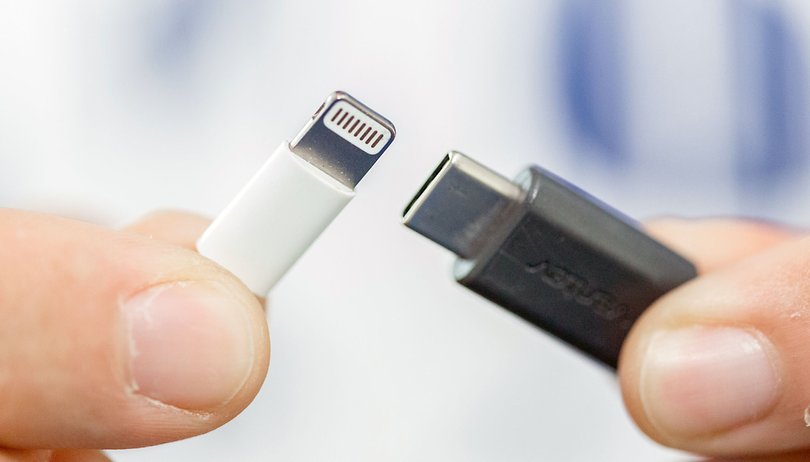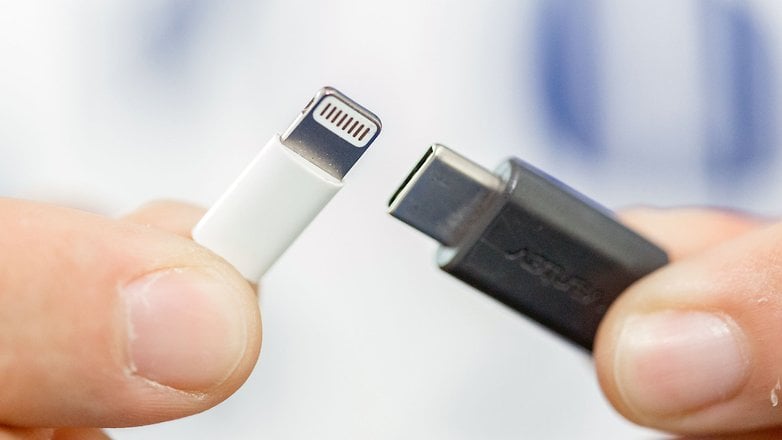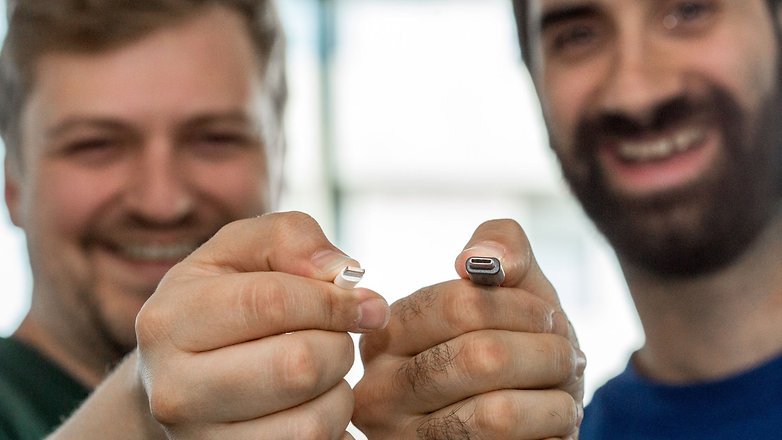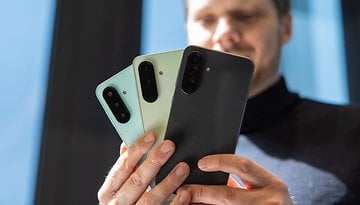USB Type-C vs Lightning


The current trend among leading smartphones is reducing their connections. The mini headphone jack is endangered and there are going to be two dogs in this fight: USB Type-C vs Lightning. We drafted two editors with different opinions to help us reach a conclusion
Luis Ortega: 5 advantages of USB Type-C
It supports high power loads
The USB 3.1 Type-C is a change of direction for device connections. And what a change. It offers the possibility of far more charge power than other standards, Type-C is capable of supporting up to 100 watts, i.e. a current up to 20 volts and 5 amperes. This is enough to fully charge a smartphone in minutes and even provides the possibility of powering a computer or other electrical device.
Most current smartphones have a 5-volt charger with one or two amps, which translates to about 5 watts or 10 watts of power. With fast-charging, this could climb up to 18 watts, but it's still far from what USB Type-C can achieve.

It transmits data quickly
The new USB 3.1 Type-C has a 24 pins connection. Type A or B, by comparison, have only 4 pins, and Apple Lightning has 8. The maximum speed at which the USB Type-C can transmit data reaches 10 Gbit / s and thus Type-C has a much higher capacity for data transmission.
It's standardized
The USB Type-C already is in many high-end smartphones and in a couple of years will be the only USB port on not only new phones, but all electronic devices, from computers, to USB flash drives, to you name it.
There are even strong initiatives for audio and video to be transferred via Type-C, with the Moto Z already dropping its headphone jack in favor of the Type-C port. And it is clear that the next HDMI plug will also make use of the USB Type-C technology.
Everyone can manufacture it
The USB Type-C is a standard that any manufacturer can make use of. And they will. This means that the price of such cables will drop as competition for them increases.

It's the future
USB Type-C is the future of electronic device connections. The next computer or smartphone you buy will probably have USB Type-C ports. Until now, we have computers with connectors such as: USB 2.0, USB 3.0 (blue), HDMI, VGA and DC-IN. In the future, all of these connectors could be replaced with USB Type-C.
Hans-Georg Kluge: 5 advantages of Lightning
Lightning has been Apple's connector of choice, at least for iPhones and iPads, since 2012. That situation is unlikely to change and there are a number of reasons for this.
Lightning was revolutionary
Before Lightning, the iPhone made use of a 30-pin connector which was bulky for small iPhones. With Lightning, Apple took a big step forward in the world of technology, the biggest milestone, perhaps, was that Lightning could be inserted into the handset in any orientation. USB did not achieve this until two years later with Type-C, only reaching consumers by the end of 2015.
Lightning has a smaller and more robust connector
USB Type-C is still fairly large and complex compared to the flat Lightning plug. Compared to the USB Type-C, it's easier to connect to a product. And it has another advantage: stress put on a USB Type-C cable is more likely to damage the smartphone, whereas stress put on the Lightning connector is more likely to harm the cheaper, replaceable, cable.

Apple can continue to develop Lightning
Apple has total control over the Lightning specifications, it can continue to increase the speed of data transmission.
Lightning brings Apple revenue
Apple rarely acts charitably and this is also true of Lightning. Apple has to grant licensing permission to those manufacturers who want to use it and this isn't free. With the iPhone 7 and iPhone 7 Plus, pressure to use Lightning has increased further. Since Apple decided to remove the headphone jack, we will soon see an increase in the number of headphones with support for Lightning on the market.
Lightning has already proven itself
Features such as fast-charging don't appear on devices with a Lightning cable, but three years ago, Lightning was definitely the best connector. Apple remains faithful to the port, and as we can see with the iPhone 7, Apple is still using it effectively.
Which cable do you prefer? Let us know in the comments.












For all those bashing Apple, they came out with the Lightning connector a full two years before USB-C was a thing. Just because USB Type-C came along eventually with a lot of the same attributes (small, reversible) does not necessarily make Apple wrong or bad for having developed their own connector.
Furthermore, Lightning is still smaller, so a better fit for their continued reduction in device sizes. USB-C requires a larger, bulkier connector on the device itself. Fine for computers, but not so fine for handheld devices that are getting slimmer.
This isn't about defending Apple, but instead of being realistic. Both connectors have their strong points. Apple *is* embracing USB-C where it makes sense — on their computers. They are not shunning that excellent technology, but they've chosen not to use it on their phones and iPads at this time. That does not make iPhones a bad purchase choice.
soo.. no specs on lightning fast charging and data transfers?
I think mobile phone manufacturers should be forced by regulation to have 1 unified standard. Its so annoying having to carry multiple chargers
Looks to me like the lightning could fit in the C plug. I'd be curious to know if this is their plan.
As per usual, the standards, like USB-C, have their advantages all listed in technical achievements, more power, faster xfer speeds. Apple falls back to essentially "it's pretty" and "innovation" having forgot what that word means long ago.
The funny thing about this article....
USB c - lists features found with the USB, its capabilities vs older USB types and ease of manufacturing in becoming a widely used standard.
Lightning - lists nothing worth of importance. "Because apple" is about all I got out of that....
Speaks alot about the consumer base if you ask me.
It lists, "Because Apple", because lighting ports are proprietary to Apple and most proprietary things aren't considered Standards....
It's been a long time since the PC industry wished to unify the cable connectors with only on capable of handling many type of signal.
You know what? Apple is doing it with mac and iphone-like devices.
Why would you like Apple to follow the Android standard?
If you're Apple, you'll go with the Lightning connector, mainly because it's proprietary, allowing you full control over the peripherals that get connected to an i-Device. Apple wants their 30%, after all.
I fail to see how it was revolutionary, and that it brings revenue to apple is a pro, the latter is more of a con in comparison.
If lightning was going to be a permanent thing for Apple they wouldn't have put Type C on the MacBook.
I am pretty sure that Lightning was simply not capable to do what they needed the connector to do in the MacBook. For the iPhones and iPads, yea I do think they are going to stick with it for a long while as it is one hell of a cash cow :( Remember that they make money with every accessory sold.
Aren't these reasons to avoid apple and lightning? You are just giving apple $$ for the sake of being apple. I don't know about you, but giving apple money for the sake of..... just doesn't suit me.
Well I like the USB TYPE-C. Clearly type - c has more pros and I'm using it.
All that I will say is standards are always better than proprietary. Even if the standard is not open, though open standards are better than closed. The use of standardization is the only way that the Internet works, it is why the PC industry has grown to where it is, it is how banks can transfer money to other banks, there are many other examples where standards have made industries and our lives far better than they were before. Apple has even started using USB-C in some places so for them to refuse to use it on their phones costs them R&D and costs their customers far more money than if they would just use USB-C.
And at the same time it makes them a ton of money through accessories. But don't get me wrong, I agree 100% with you, standards are and allways will be the most important thing.
Sounds like the usb-c connector is faster at charging, transfers data faster, is more durable and will be cheaper in the near future. I have a nexus 6p that users it, and I am happy enough with how it works. Lots better than previous USB connectors.
I can't see this is about the advantages of one over the other or which I prefer. You don't get a choice if you are Android you get USB whether 2 3 or Type C. If Apple it is now the lightning connector. USB type C sounds better but for me there is no choice
Your point about connector durability is just flat out wrong.
It sounds like you need a history lesson.
The Lightning connector was not designed by Apple, it was designed by Intel to be the physical connector for the USB-C standard that was in development.
When Intel presented the connector to the USB-IF, the IF ran it through it's paces and rejected it due to poor reliability and the fact that the port, not the cable, took all the wear.
Intel, not wanting to put all their R&D money to waste, sold the connector to Apple and went back to the drawing board to make a more reliable connector that wears on the cable side instead of the port.
Next time at least try to act a little like a journalist and use Google before posting an article.
You're rather arrogant and condescending for someone who misunderstood the point. The article was talking about whether the plug or the port would break if you drop it (for example), not where they will wear through everyday use.
Although wear is a good point that should have been included in the article.